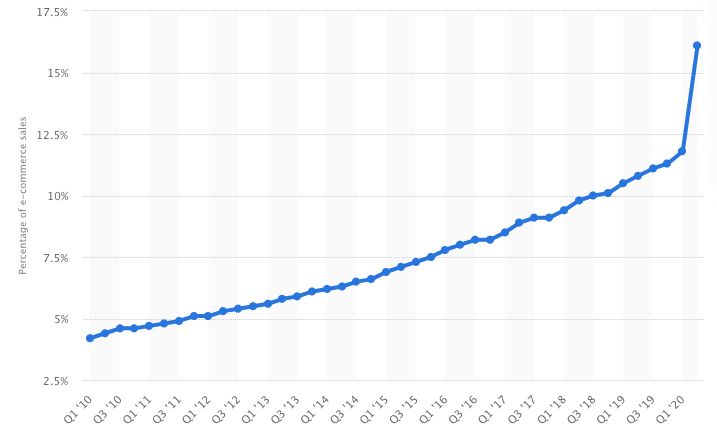- A digital banking app for small businesses, freelancers, and startups
- Send payments, deposit checks, and access funds easily
- Smart money management – Budget with envelopes, integrate with tools like PayPal and Stripe, and get real-time insights
The million-dollar question in this growing internet marketplace is what is an ecommerce website, and what makes the profitable ones successful?
In 2016, I made my first ever dollar online.
I started an ecommerce, and within a year I started making money from it.
It wasn’t much, just $1.
But since then, I’ve found how to money consistently from each product I’ve listed. Then I started making $3,000 a day (consistently) in total with my ecommerce sites. Had to get a free business checking account, and I felt so proud of myself.
There’s no doubt in my mind that the best way to make money online is by starting an ecommerce business online.
So how can you start an online business and start earning from it fast?
5 Strategies to Grow Your Ecommerce Business
Ecommerce growth is off the charts and is expected to continue to grow at lightning speed as more brands embrace the digital retail landscape.

It may be daunting trying to break into the ecommerce sector when it seems like Amazon and other ecommerce giants have total dominion over the industry. But the truth is that there is still an enormous opportunity for new players to break into the ecommerce game.
Especially, when there are numerous niche markets that aren’t being adequately represented on by internet giants. With ecommerce sales at an all-time high, now’s the time to get your own ecommerce website up and running.
While the ecommerce economy is poised for significant growth to infinity and beyond (so to speak), your business can only expect to see similar results if you build your own ecommerce website in the right way.
In order to hold your own and rake in the big bucks without much work, there are certain features your ecommerce website needs and some things you can do to maximize success. Here’s what an ecommerce website needs to succeed.
1. Design Your Website to Be Inviting
The first, obvious feature needed for a successful ecommerce website is an excellent website design. This may seem like common sense, but it can’t be said enough. Your ecommerce website must accurately represent your business in an appealing way. That means making sure you’re designing it for your customers, not your own personal taste.

Whether you like it or not, people aren’t merely comparing your website to the sites of your competition anymore. They are now stacking it up against the aesthetically pleasing ecommerce experiences they’ve become accustomed to across the Internet in its entirety.
Having an excellent website design also means having a high level of functionality. You must consider the growing use of phones for online shopping and make sure your ecommerce website is mobile-friendly. The easier and more diverse ways that customers can purchase things from your ecommerce website, the more likely that you will be successful. Selling well also has a lot to do with how you present your products.
In summation, design matters. And that’s just another way that ecommerce is highly competitive.
2. Optimize Your Product Images & Descriptions
Once your excellent website design has done its job luring in possible customers and guiding them to your product pages, continue the process forward with this momentum to high-quality photos and detailed product descriptions.
Make sure the visual content used to portray your products are professional and go above and beyond to give your customers a 3D view using a 2D medium. Product descriptions on your ecommerce website need to be informative, tailor to the tone of your audience and be loaded with SEO keywords that cater to Google as well.
It might also be helpful for you to offer virtual shopping assistance if possible. At the very least, give customers the option to contact you if they have questions or product concerns. This realistic shopping experience goes a long way in building your ecommerce website and ensuring longevity.
3. Offer Stellar Customer Service
Previously alluded in the last section, it’s important to have top notch customer support.
Online shoppers are more likely to buy when they know they can contact you, so be sure to highlight how they can do so on your ecommerce website. This means making sure they can reach you the way that they enjoy reaching an ecommerce associate. Add a contact form, phone number, email, and everything in between to appear 100-percent accessible to your customers. Even if you don’t get a phone call, your customers will feel as if you are more than available and ready to help.
Your customers will also want to know they will have support after they make a purchase if needed. Guaranteeing to troubleshoot after the purchase and consulting before the purchase has the ability to convert potential buyers into loyal, returning customers. Building that trust with customers means they will recommend you to others, and that’s the best free advertising around.
4. Welcome Reviews to Boost Your Trustworthiness
Customers often spread the good news about your ecommerce website when you show that you’re trustworthy. With so many sketchy ecommerce websites and scams out there, you need to prove to that you are the real deal. It’s likely that you’ve had a bad experience with a questionable ecommerce website, and you know how that builds distrust in all ecommerce sites. Don’t let that be an issue, even if a customer’s negative experience was elsewhere.
Showcase customer reviews, testimonials, or any other kind of social proof to flaunt your stellar reputation and boost your trustworthiness. More is better so don’t be shy about asking your customers to leave a review after making a purchase.
Similarly, installing security and purchasing an SSL Certificate for things like a padlock for usernames, passwords, and credit card info are necessary measures to be taken. These used to be features, but now they are fairly standard for all ecommerce websites that do well.
5. Use an On-Site Blog to Capture Search Traffic
Another helpful addition to your ecommerce website would be to add a professional blog. You shouldn’t treat a business blog for your ecommerce website as an unnecessary luxury. A blog is one of the best ways to build your audience and generate more traffic and more sales. Blogs improve SEO greatly and are a wonderful marketing platform for telling your story.
Hiring a professional blogger is a good investment with a high return because they are masters in the art of persuasion. After all, the main goal of your blog is to persuade your readers to buy your products. This goes a long way and translates to real sales and steps forward.
There are a ton of new ecommerce websites being created every day. Stand out by making sure these tips are a part of your website’s development. Yes, customers want to feel confident in their purchases not only as consumers of a product but as individuals conducting business with a seller. Offer them a user-friendly, convenient experience they can trust, and you will find a secure spot in the ecommerce market.
Ecommerce Logistics: From Your Site to Their Doorstep
Imagine ordering online and your order unexpectedly takes a while before arriving. You follow up with the platform’s customer service just to be answered with “Your package is already with our 3rd party logistics for delivery”. And every time you call, you always get the same answer. Frustrating isn’t it? Don’t worry, you, as the customer isn’t the only getting annoyed. The e-commerce platform is, too.
Just with this situation, you already know how important an effective logistic partner is in today’s world. With a lot of the world’s population making transactions online, you can only imagine how many orders arrive at every platform’s doorstep. As someone who is part of the e-commerce industry, you should know how logistics companies can make or break your online platform.
Advantages of Effective Logistics to E-Commerce
Visibility of Stocks and Items
The first advantage starts with visibility of stocks and items. In e-commerce’s point of view, an effective logistics company can serve as their eyes to the stock levels of each and every SKU they have. With this, an e-commerce company can determine whether or not to replenish certain items. Ideally, the logistics company will give them weekly or monthly reports that show the stocking levels of every item. Some companies can even do these reports in real time.
Visibility of stocks isn’t only beneficial to replenishment. It’s also important in accounting for the current inventory you have on hand. This will give you an idea if you have a lean inventory or a lot of sitting capital in your warehouse.
Efficient Picking and Packing
Second, a logistics company can do the picking and packing themselves. Once orders are confirmed, these will be routed to the warehouse and logistics can start picking and packing your order.
An efficient and thorough logistics company can minimize the wrong orders that are sent to your customers. If a logistics company fails to do this, more customers will complain which will eventually lead to a decline in sales for an e-commerce platform. To add to that, constantly having wrong orders will make a dent on your financials because of the extra costs for delivery and handling.
100% Order Fulfilment
If you have an effective logistics partner, then you can achieve 100% order fulfillment. This means that you won’t have any backlogs. Backlogs refer to delayed orders that have not been shipped. The fewer backlogs you have, the better for your customers and your supply chain.
And it’s not just the order fulfillment that benefits your company. When your logistics partner is set to deliver at the earliest possible time, you can achieve a faster lead time. This will always look good on consumers because they know that you can be trusted.
Tracking of Delivery Items
Another benefit is the visibility of the packages’ status. On the consumer level, an effective logistics partner allows them to see where their orders are from order confirmation to delivery. On the e-commerce company’s end, they will be able to answer any inquiries their consumers have regarding the movement of the package.
Moreover, if there is an inventory management system in place, the e-commerce company does not have to constantly follow up or ask logistics where the orders are. This lessens the amount of time you spend on calling. Although communication is always a good thing, there are more efficient ways of doing it that don’t involve calling the logistics partner for updates on each and every order.
Proper Handling of Reverse Logistics
It’s not just fulfilling orders that logistics can do. In fact, good logistics should also have a streamlined process for reverse logistics. This means they should be able to accommodate in a hassle-free way the return and exchange of items. Although for starting e-commerce platforms, most purchases cannot be refunded or returned, moving forward this should not be the case.
Allowing the return and exchange of items is an added bonus for your company. When consumers know that they have a means of refunding their orders, they will have more reason to use your e-commerce business.
Ease of Communication with Clients
Last but definitely not least is the ease of communication. In today’s world, it’s important for both the e-commerce company and the logistics party to communicate effectively. Without this, there will be a lot of misunderstanding regarding inventory, orders, lead time, etc.
Communication is an often-overlooked part of any business. But without an effective means for communication, an e-commerce company can fail. This is because consumers these days expect visibility of their orders and great customer service. There are companies that have a disconnect between their customer service and partner logistics.
In today’s world, a reliable and efficient logistics partner shapes the way e-commerce is evolving. Based on these 6 advantages, you can already understand how important logistics is for this industry. Without it, businesses can fail and customer trust will dwindle. So if you are looking for a logistics partner, you could use these advantages as your checklist to consider. In this way, you can thoroughly assess which logistics partner will be the perfect fit for your business needs.
FAQs
Some key factors include having a user-friendly website, offering high-quality products, having a strong marketing strategy, providing excellent customer service, and having a secure payment system.
Focus on making navigation easy, optimizing for mobile devices, having clear product information and high-quality images, offering multiple payment options, and providing easy access to customer service.
Use search engine optimization (SEO), pay-per-click (PPC) advertising, social media marketing, email marketing, and influencer marketing.
Offer promotions, upsell and cross-sell products, personalize the shopping experience, offer fast and reliable shipping options, and collect customer reviews.
Offer multiple channels for customer support, respond quickly to inquiries, proactively address and resolve customer complaints, provide clear return and refund policies, and follow up with customers after their purchase.
- 1. Design Your Website to Be Inviting
- 2. Optimize Your Product Images & Descriptions
- 3. Offer Stellar Customer Service
- 4. Welcome Reviews to Boost Your Trustworthiness
- 5. Use an On-Site Blog to Capture Search Traffic
- Visibility of Stocks and Items
- Efficient Picking and Packing
- 100% Order Fulfilment
- Tracking of Delivery Items
- Proper Handling of Reverse Logistics
- Ease of Communication with Clients
- A digital banking app for small businesses, freelancers, and startups
- Send payments, deposit checks, and access funds easily
- Smart money management – Budget with envelopes, integrate with tools like PayPal and Stripe, and get real-time insights









